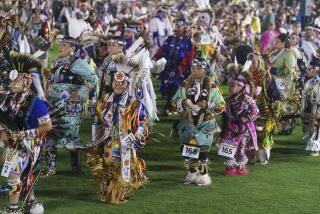Juanenos Should Pursue Recognition, Forget Casino
- Share via
The split among factions of the Juaneno Band of Mission Indians already had raised understandable concern that the federal government might delay official recognition of the tribe. But even more disturbing are the disclosures that one faction has floated a misguided proposal to build a Las Vegas-style casino in San Juan Capistrano and has accepted hundreds of thousands of dollars from outsiders who stand to gain from legalized gambling.
The San Juan Capistrano City Council this month condemned the suggestion that a casino be built in the city. The statement was more strongly worded than necessary, but the sentiment was right. Neither the city nor Orange County needs a casino, as voters in several cities rightly have made clear in the last few years.
The Juanenos’ attempt to win recognition from the federal government is hardly new. The tribe first applied to Washington more than a century ago. Even after the split in the tribe two years ago, the U.S. Bureau of Indian Affairs did put both factions on the list to be considered for recognition. Either might win recognition, or both might fail, according to bureau officials, who said they are aware of the quarrel.
Recognition would allow the Juanenos to establish a sovereign government, which in turn would provide the opportunity to receive federal health and education programs established specifically for Native Americans. It would also give the tribe a chance to open a casino, with all the revenue that implies.
Members of the faction supporting a casino said they did not step up their campaign for recognition in an attempt to bring gambling to town, a claim that prompted raised eyebrows even among members of other tribes.
The leader of one Juaneno faction, David Belardes, originally supported a casino but later changed his mind. While a supporter, he said a casino could help pay off any debts the tribe ran up in campaigning for recognition. That was and is an unpersuasive argument. The tribe would be better off limiting its spending on its campaign.
Belardes said the tribe had received about $400,000 from a Las Vegas-based group of investors eager to see a casino open. Belardes became a casino opponent after what he said was a push by the investors for greater control over tribal affairs. Belardes should use his influence to see to it that the casino proposal is dropped.
True, the spread of casinos on Native American land has been enormous in the past decade, as has the spread of legalized gambling across the country. As recently as 1984, only Nevada and New Jersey had legalized casinos. Now nearly half the states have casinos on land, water or Indian reservations. Unfortunately, the casinos have spread without needed oversight. The federal government did not get around to establishing a commission to study the effects of such widespread gambling until this year.
During election campaigns to establish card clubs in Cypress and Stanton four years ago, Orange County law enforcement officials announced their opposition because of concerns that they would increase crime and corruption. Those fears gained support earlier this year when federal officials announced the indictment of 17 people, including five linked to a Pittsburgh organized crime family, for allegedly attempting to infiltrate and control a gambling casino at the Rincon Indian reservation north of San Diego. The casino has gone out of business.
The Juanenos say they are Orange County’s original settlers, known as the Acjachemen Nation and dubbed Juanenos by the Spanish, who used them to help build the mission at San Juan Capistrano. They should continue their campaign for federal recognition and drop the casino proposal.
More to Read
Sign up for Essential California
The most important California stories and recommendations in your inbox every morning.
You may occasionally receive promotional content from the Los Angeles Times.










